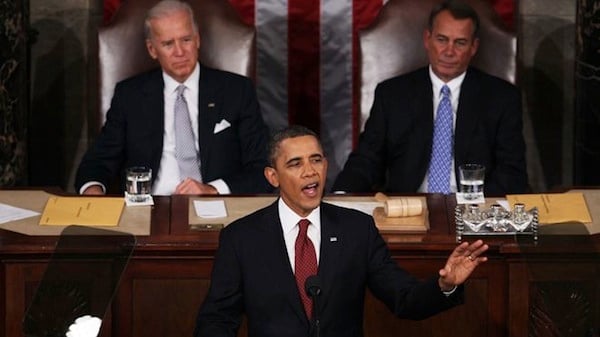
President Obama gives the State of the Union speech. Source: Getty/Fox News
As many of us here at foreignpolicyblogs.com noted during the presidential race, this was an election centered around the economy and not foreign policy. Tuesday night’s State of the Union address continued this dynamic, with foreign policy issues receiving only a passing mention.
I expected President Obama to more explicitly build on the “foreign policy is economic policy” theme that Secretary Kerry raised during his confirmation hearing — and that President Obama himself put forth on the campaign trail — but this was implicit in what he said about bolstering the middle class and strengthening the economy. Obama’s memorable declaration that “the greatest nation on Earth cannot keep conducting its business by drifting from one manufactured crisis to the next” echoed Kerry’s statement that “it is difficult enough to solve some of the problems we face, but it becomes near impossible if we ourselves replace our credibility and leverage with gridlock and dysfunction.”
On cross-border economic matters, President Obama combated fears of American decline head on, celebrating products made in the U.S.:
Caterpillar is bringing jobs back from Japan. Ford is bringing jobs back from Mexico. After locating plants in other countries like China, Intel is opening its most advanced plant right here at home. And this year, Apple will start making Macs in America again.
He also spoke to concerns about the economic competitiveness of American students, saying:
Let’s also make sure that a high school diploma puts our kids on a path to a good job. Right now, countries like Germany focus on graduating their high school students with the equivalent of a technical degree from one of our community colleges, so that they’re ready for a job.
As someone who follows the rhetoric about American decline and competitiveness, I found the Germany example to be particularly compelling. So often, America’s economic challenges are addressed in the context of China’s rise. For every infrastructure issue America faces, China has just built miles of new highways; for every shortcoming in the U.S. educational system, China is quickly catching up to us, teaching its students STEM subjects in ways we would do well to emulate.
While this sort of talk is useful to the extent that it makes America’s leaders aware of a rapidly evolving global landscape, its utility quickly fades when it comes to inspiring practical solutions. True, the pace of China’s economic transition has been breathtaking, but China and the U.S. are at radically different stages of economic development and have political systems so dissimilar that it is often impossible for the two countries to undertake similar policy responses to similar policy challenges. As far as policy solutions go, Germany is a much more relevant case study. However, when discussing U.S. competitiveness on energy, President Obama did mention that “as long as countries like China keep going all-in on clean energy, so must we” — the theme of the innovation arms race is alive and well.
President Obama had a similarly reasonable take on the state of U.S. infrastructure — which a recent World Economic Forum report ranked as 25th in the world — linking the issue to job creation and safety. (It is interesting to note that the same report ranks the United States 54th in the world for “public trust in politicians.”)
While foreign policy did not take center stage in Obama’s speech, it had an even smaller role in Marco Rubio’s GOP response. Rubio, who primarily criticized Obama’s economic policies and similarly talked about “bring[ing] manufacturing back from places like China,” also added:
On foreign policy, America continues to be indispensable to the goal of global liberty, prosperity and safeguarding human rights. The world is a better place when America is the strongest nation on earth. But we can’t remain powerful if we don’t have an economy that can afford it.
Rubio’s comments on the U.S. as an indispensable nation echoed one of Secretary Clinton’s farewell speeches, and his linkage of U.S. foreign policy and the state of the U.S. economy is in keeping with the theme of Secretary Kerry’s confirmation hearing speech. As in the presidential campaign, there is a relative amount of agreement between Republicans and Democrats on foreign policy matters at the moment: Americans are not seriously debating an issue like whether to put boots on the ground in Syria, and on the whole, drone strikes remain fairly popular. With foreign policy issues relatively deprioritzed on the national political stage — for better or for worse — it is prime time to tackle the controversial economic issues that leaders from both parties agree are attenuating U.S. power abroad. However, it remains to be seen whether U.S. leadership is up to the task.